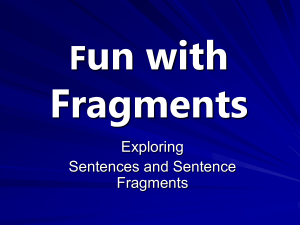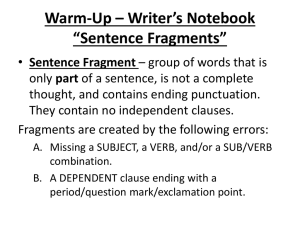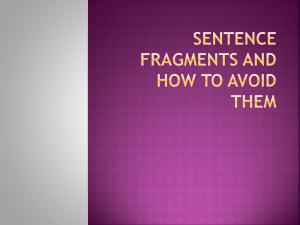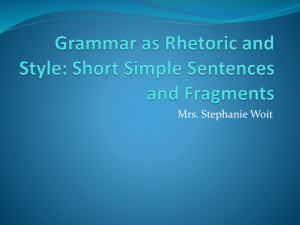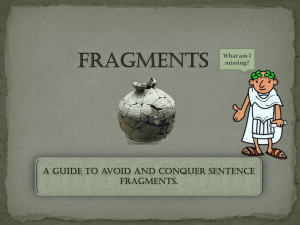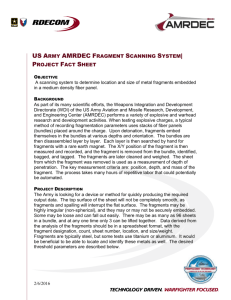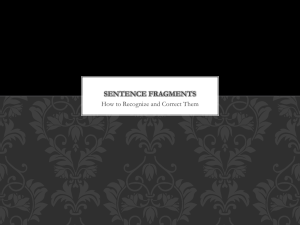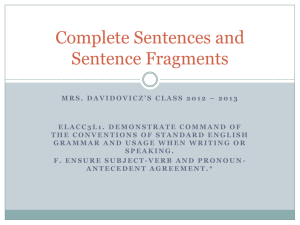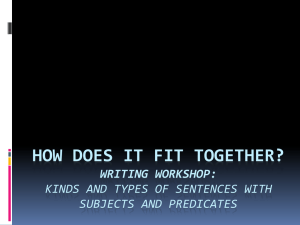Sentence Fragment vs Complete Sentences
advertisement
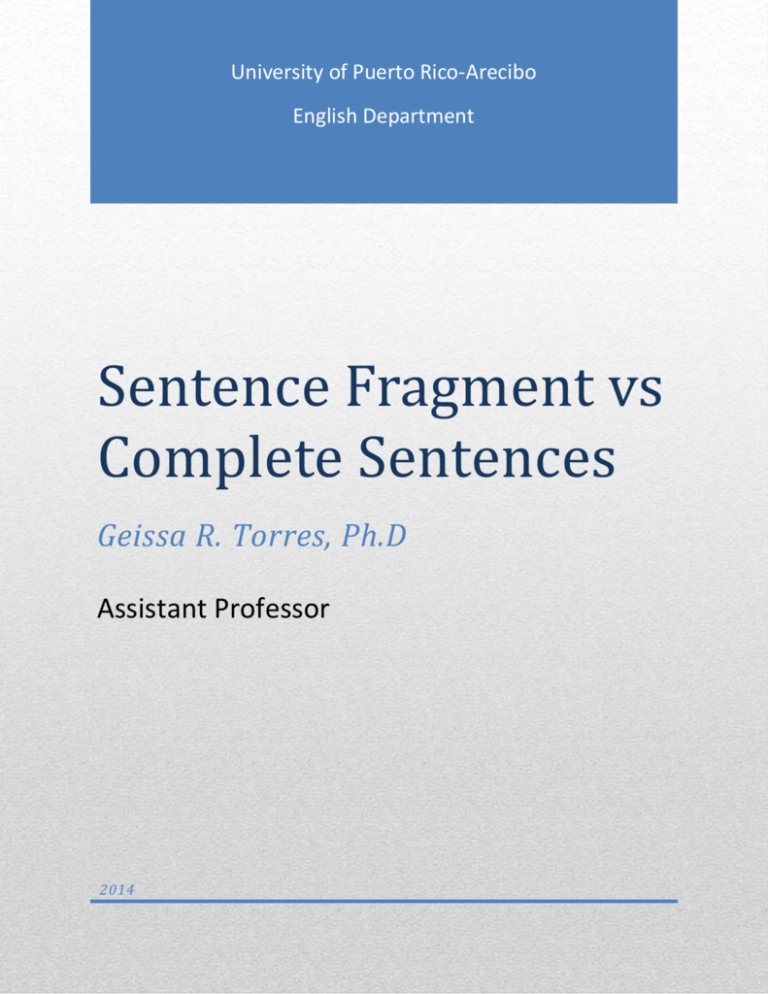
University of Puerto Rico-Arecibo English Department Sentence Fragment vs Complete Sentences Geissa R. Torres, Ph.D Assistant Professor 2014 EXPLANATION What is a sentence? A sentence fragment? What is a sentence? Here are two definitions that may be useful: Definition 1: A sentence is a group of words arranged to express a complete thought. The arrangement of the words follows the rules of English grammar. Definition 2: A sentence is group of words that begins with a capital letter, has a subject and a complete or finite verb, and ends with a period. Complete sentences are also sometimes called independent clauses. Groups of words that modify part or all of an independent clause are called dependent clauses. Dependent clauses begin with subordinating words (relative pronouns, prepositions, or adverbs). By themselves, dependent clauses form sentence fragments. Keep the distinction between dependent and independent clauses in mind, because it will help you tell the difference between sentence fragments and complete sentences. It is useful to group sentences into 4 types. 1) Simple sentences, which have one subject and one verb. a. Example: Pinnochio hoped to become a real boy 2) Compound sentences, in which a conjunction links two simple sentences. a. Example: Pinnochio hoped to become a real boy, and the Blue Fairy granted his wish. 3) Complex sentences, which join a dependent clause to an independent clause. a. Example: After the Blue Fairy granted his wish, Pinocchio lived happily ever after. (“After the Blue Fairy granted his wish” is a dependent clause; “After” is the subordinating word.) 4) Compound-Complex sentences, which combine types 2 and 3. a. Example: After Pinnochio saved Gepetto, the Blue Fairy granted his wish, and he became a real boy. A sentence fragment is an incomplete sentence punctuated as if it were complete. Consider the following passages to see if you can locate the sentence fragments: She didn't want to be on vacation anymore. She wanted to be to her own house. A house that meant so much to her. Visiting downtown takes you back to the time when there was a single sweet shop, baker, and post office in every city. A time when people knew the shopkeeper by name and knew about each other’s lives. In each paragraph, the last sentence is a fragment. The last sentence in the first paragraph lacks a sentence verb; and in the second paragraph, the word "when" turns the clause into a subordinate clause. In the rest of this module, students will learn how to correct sentence fragments. Correcting Sentence Fragments... Dependent clauses, and other groups of words that lack a subject or a verb, are called sentence fragments. Think of them as broken or incomplete thoughts. You need to fix them, so that your reader can understand your thoughts. Below, the common sources of sentence fragments are identified, and examples are given to help you identify and correct fragments in your own writing. Sentence Fragments Caused by a Missing Verb: After years of searching for a cancer cure, the scientist finally. This thought feels incomplete. It has a subject--“the scientist”--but not a verb. We wonder what the scientist finally did. Note that the thought can be completed in a number of different ways: Corrected: After years of disappointment in her search for a cancer cure, the scientist finally made a breakthrough. or After years of disappointment in her search for a cancer cure, the scientist finally gave up. Other examples . . . My favorite flavor of ice cream. The two puppies. The clouds drifting in the sky. Corrected: My favorite flavor of ice cream is mint chocolate chip. (verb: “is”) The two puppies chased each other. (verb: “chased”) The clouds were drifting in the sky. (complete verb: “were drifting”) Verb forms that end in “ing,” or participles, are not complete by themselves. They need an auxiliary or “helping” verb. In the last example above, “were” is the helping verb that completes “drifting.” Sentence Fragments Caused by a Missing Subject: Zoomed down the slope on my new snowboard. Went to the video store. Hoping to be free. Corrected: I zoomed down the slope on my new snowboard. (subject: “I”) Tess and her mom went to the video store. (subject: “Tess and her mom”) The slaves were hoping to be free. (subject: “The slaves”) Sentence Fragments Made up of Dependent Clauses: Because she was pregnant with my baby brother. While sleeping in Baby Bear’s bed. After I changed my fuel filter. Who led the slaves to freedom. Corrected: Because she was pregnant with my baby brother, my mother decided not to go skydiving with us. While sleeping in Baby Bear’s bed, Goldilocks dreamed of flying. After I changed my fuel filter, my car’s gas mileage improved. Moses was the prophet who led the slaves to freedom. At this point, you may be thinking these fragments are pretty easy to identify. In the real world, however, fragments are sometimes quite difficult to spot. They are often closely connected to a point in a previous sentence, and so they seem like correct sentences even when they are not. Take a look at the paragraph below and see if you can spot the fragments: The “nuclear family” has been the model for American home life since at least the 1950s when shows such as Leave It to Beaver and Ozzie and Harriet were popular. In each of these shows, a steadfast and masculine father, a proper and demure mother, a little rascally boy to take after the father, and/or a perfect princess girl to bake with the mother, all living in a quiet suburban home with a white picket fence. The last, long sentence is actually a fragment. The verb "living" is not complete, and so the sentence is a series of phrases. To correct the sentence, the subject must be located, and the correct form of the verb provided: The “nuclear family” has been the model for American home life since at least the 1950s when shows such as Leave It to Beaver and Ozzie and Harriet were popular. In each of these shows, a steadfast and masculine father, a proper and demure mother, a little rascally boy to take after the father, and/or a perfect princess girl to bake with the mother, all live together in a quiet suburban home with a white picket fence. One technique for spotting fragments is to reformat your essay, temporarily, as a worksheet. With this technique, you use a simple command to quickly separate each sentence onto its own line, so that the sentences can be seen more clearly. Click on the link below to go to a video lesson on using this technique: Using Sentence Fragments for Special Effect... Get a bicycle. You will not regret it. If you live. —Mark Twain Occasionally, it is acceptable to use a sentence fragment for a special effect. However, be very careful here. Your reader may assume the fragment is unintentional if the rest of your writing is not polished and free of errors. A fragment can create emphasis on a single word or phrase: He stood stock still. Listening. Waiting for the sound of an approaching car. Baseball. The most American of sports is experiencing a real return to popularity. She wants a home with a white picket fence. Ozzie & Harriet's house, if possible. A sentence fragment can also be used to express a strong emotion: Selma told her dad she finished her homework. Yeah, right! She didn't even open her math book. Wow! I never knew that you could play soccer so well. A fragment can be used to present an answer to a question: How did we win the tournament? Nerve. Frag. = Sentence Fragment If you see the symbol above on an essay, lab report, or other text, it means that you have written an incomplete sentence, which is also known as a sentence fragment or fragment. What attributes must a sentence have in order to be a complete sentence and not a fragment? 1. A complete sentence has a subject. 2. A complete sentence has a verb. In fact, it must have a complete verb. 3. A complete sentence expresses a complete idea. A Basic Overview of Sentence Fragment Errors 1. Missing Subject Fragment: Began the search for a space in the crowded student parking lot. In the sentence above, the writer does not tell the reader who was searching for a parking space. Correct: Ned began the search for a space in the crowded student parking lot. To correct this type of error, add a subject to the sentence to indicate who or what is/was/will be doing the action. 2. Missing Verb Fragment: Five minutes before class, Ned still searching for a space in the crowded student parking lot. Correct: Five minutes before class, Ned was still searching for a space in the crowded student parking lot. In the first sentence above, there is a verb, but it is incomplete. The helping verb “was” is needed. Errors such as this often occur because writers mentally fill in the blanks and do not proofread closely enough. 3. Incomplete Idea Prepositional Phrases Fragment: Next to an empty space in the crowded student parking lot. Correct: Ned saw a broken bottle next to an empty space in the crowded student parking lot. When using one or more prepositional phrases, be careful to add a complete sentence. For example, in the corrected sentence above, the reader learns that a broken bottle sat next to the empty parking space. Subordinate Conjunctions Fragment: When Ned began the search for a space in the crowded student parking lot. Correct: When Ned began the search for a space in the crowded student parking lot, he was already five minutes late for class. Correct: He was already five minutes late for class when Ned began the search for a space in the crowded student parking lot. Subordinate conjunctions are very useful. They help writers to explain relationships between ideas, to create smooth transitions, and to vary sentence patterns. Experienced writers often use subordinate conjunctions when constructing sentences. When beginning a sentence with one of these words, however, be careful to express a complete idea. In each of the corrected sentences above, a complete sentence needed to be added. http://sites.newpaltz.edu/owrc/wp-content/uploads/sites/16/2013/11/handout_lesson2_sentence_fragments.pd Online Games: http://www.quia.com/pop/13222.html Online practice quizzes: http://www.softschools.com/quizzes/grammar/recognizing_sentence_or_fragments/qu iz2130.html http://www.softschools.com/quizzes/language_arts/complete_sentence_or_fragment/ quiz1524.html
